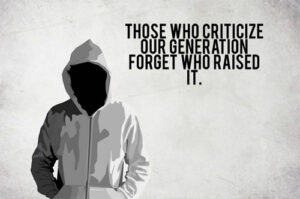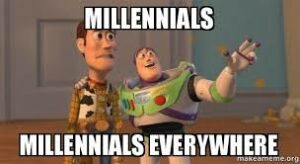 We may have a little bit of an over-discussion on all the generational differences currently co-existing in the workplace (Silents, Boomers, X, Millennials, and now Gen Z), but even with a little hand-wringing over “the Millennial mindset,” these topics are pretty important.
We may have a little bit of an over-discussion on all the generational differences currently co-existing in the workplace (Silents, Boomers, X, Millennials, and now Gen Z), but even with a little hand-wringing over “the Millennial mindset,” these topics are pretty important.
Why? Well, for one, this is a really interesting time in terms of entry-level jobs — which is what Gen Z would mostly be aiming for now. That’s because entry-level jobs tend to be rote, task work-focused, and are increasingly at risk for automation.
But if there’s no clear pathway into an organization, and organizations don’t want to start people in the middle (salary-wise and responsibility-wise), what happens? Deloitte actually wrote an entire paper on this at the end of 2017.
Getting the attention of candidates
In addition, there are questions about the alignment of higher education with work, because a college degree is essentially a prerequisite for most white-collar jobs now, as 60 percent of jobs (per Deloitte) are believed to need one.
Then we have that “Millennial mindset” from above.
Because Millennials (and Gen Z) are a more open, tech-connected generations, ideas about management may be a concern. We could see less command and control and more agile groups and collaboration. We could, or the status quo of hierarchy and direct reports may persist. Those models are being experimented with at various companies, in various states of success and failure, right now.
 But regardless of what you think about the meaning of all these generations entering the workforce, you still have a job to do: Yes, there are requisitions and open seats to fill. You’re going to need quality talent from X, Millennial, and Z — and heck, you might still be recruiting Boomers depending on their connection to work and the health of their 401(k).
But regardless of what you think about the meaning of all these generations entering the workforce, you still have a job to do: Yes, there are requisitions and open seats to fill. You’re going to need quality talent from X, Millennial, and Z — and heck, you might still be recruiting Boomers depending on their connection to work and the health of their 401(k).
Getting the attention of a Gen Z is a lot different than getting the attention of a Boomer.
We won’t belabor that point because you know the big reasons why: technology and the rise of mobile. Within that big bucket of “technology” comes sub-buckets like social media, digital marketing, job boards, job ads, etc.
What actually works?
File this one under “what’s old is new again,” but at #HRTX DC — held recently at the HQ of Brazen — Jo Weech facilitated four discussions on university recruiting, and this always popped out:
As with most hiring and sourcing, Weech noted several times, “relationships are everything.” Most candidates do ultimately want to know what’s in it for them — either in terms of salary, culture, potential for advancement, skill development, etc. You can leverage employees who went to those schools or served as interns. They can define the candidate experience and employee experience as they consider applying.”
A lot of our attendees at that event were concerned about social, and they had heard Millennials and Gen Z weren’t on Facebook (which is largely true, as Business Insider has even reported in Generation Z could kill Facebook).
But where do you reach them? Snapchat? Instagram? (Yes. Yes.) But what if you don’t have dedicated social? Or what if marketing is a specific silo and wants to do their thing and not listen to HR/talent acquisition?
These are the concerns and battles of the current recruiting landscape.
One recruiter told this story:
The hiring manager wanted to be on big job boards (Indeed, etc.) for a content role. The recruiter was proposing niche job boards for writers and editors. The hiring manager wanted a wider swath of candidates, so some head-butting ensued. Without that being resolved, they moved to social. Marketing was brought in, but couldn’t schedule a campaign for 28 days — even though the seat they were trying to fill was open now.
These things happen every day in organizations. And, they are big challenges that need to be navigated when promoting an open position.
There are some quick hits to help you get that Gen Z talent, though:
- Respect the attention span — It’s declining, so tailor info about your company to something that can be consumed in the span of a, you guessed it, snap.
- Value communication — The candidate black hole deal really needed to end two generations ago, but for sure it needs to end now.
- They actually might value independence more than Millennials, who tend to value collaboration — Again, both of these are generalizations and every individual is different, but … respect the idea that they can work on projects as an IC.
- They want to be entrepreneurial — They grew up seeing guys like Zuckerberg make billions off a relatively simple idea, so if they’re going to go the corporate route, they want to know they can iterate and experiment.
Want more hacks and tips? Then #HRTX Dallas is for you
 Remember above when we hit on #HRTX DC? We’re doing another one on March 8 in Dallas — #HRTX Dallas 2018.
Remember above when we hit on #HRTX DC? We’re doing another one on March 8 in Dallas — #HRTX Dallas 2018.
This will actually be an interesting intersection point because cost of living is getting so high on the coasts (LA/SF/Seattle and Boston/NY/Washington, etc.), you’re seeing more and more young people moving/starting their careers in North Texas. DFW’s young population growth has way surpassed the rest of the country.
So, a lot of recruiters and talent executives at this event will be facing this exact question: How do you get people in their 20s to want to work for you? The conversations should be pretty — let’s use a Gen Z term here — LIT, so definitely come on out if you live in the vicinity.
We would love to see you there at #HRTX Dallas 2018. Here’s where you can go to sign up.
Authors
Ted Bauer
Originally from New York City, Ted Bauer currently lives in Fort Worth, Texas. He's a writer and editor for RecruitingDaily who focuses on leadership, management, HR, recruiting, marketing, and the future of work. His popular blog, The Context of Things, has a simple premise -- how to improve work. Ted has a Bachelors in Psychology from Georgetown and a Masters in Organizational Development from the University of Minnesota. In addition to various blogging and ghost-writing gigs, he's also worked for brands such as McKesson, PBS, ESPN, and more. You can follow Ted on Twitter @tedbauer2003, connect with him on LinkedIn, or reach him on email at [email protected]
Recruit Smarter
Weekly news and industry insights delivered straight to your inbox.





